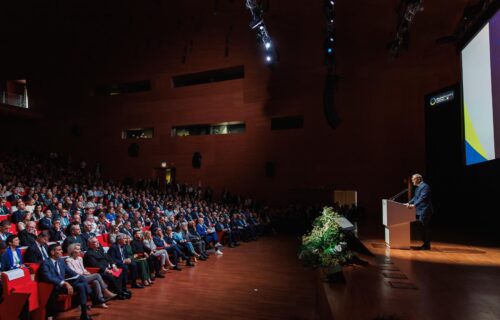As Ukraine continues its daily struggle against Russian aggression, the international community is increasingly focused not only on immediate support but also on long-term plans for rebuilding the war-torn nation and integrating it with the European Union. At the recent Ukraine Recovery Conference held in Rome, Polish Prime Minister Donald Tusk presented a detailed vision for Poland’s role in this effort, positioning reconstruction as both a humanitarian duty and an economic opportunity for collaborative projects with mutual benefits. Discussions are already underway for Poland to host next year’s edition of the conference.
Since the outset of the Russian invasion, Poland has been one of Ukraine’s key allies, contributing more than 25 billion euros in humanitarian, military, and refugee aid. Building on this commitment, Prime Minister Tusk outlined a model for Poland’s engagement in Ukraine’s reconstruction, centered on the development of transport, trade, and investment. He emphasized that the reconstruction effort is not only about physical rebuilding but also about connecting Ukraine more closely with Europe, paving the way for its future EU membership.
In the area of infrastructure, Poland plans to enhance its road, rail, and communication networks. Currently, about 90 percent of military supplies headed for Ukraine transit through Polish routes. These same corridors are expected to carry the materials and goods necessary for Ukraine’s post-war reconstruction in the years ahead.
Tusk highlighted that while Poland remains firmly committed to supporting Ukraine in its conflict with Russia, it is also determined to ensure that Polish businesses can play a significant role in the reconstruction efforts and benefit from this extensive undertaking. He described ongoing discussions as promising for Polish enterprises looking to participate in rebuilding projects.
Poland already plays a crucial role in trade with Ukraine, accounting for 30 percent of the European Union’s exports to the country. As trade volumes grow, so too do opportunities for investment, underscoring the economic potential tied to the reconstruction process.
During the Rome conference, Tusk engaged in multiple bilateral and multilateral meetings. He participated in discussions with leaders from the United Kingdom, France, Italy, Germany, Denmark, and Ukraine, as well as officials from the European Commission and NATO. He also met separately with Italian Prime Minister Giorgia Meloni and Ukrainian President Volodymyr Zelensky. These conversations addressed potential facilitation for large projects involving Polish state-owned companies like Orlen and LOT, as well as banks and private enterprises that may require government support to engage in Ukraine.
Tusk explained that he and President Zelensky agreed on the need for a joint approach to certain business initiatives, allowing for simplified procedures and coordinated strategies between the two governments. He also held talks with Odile Renaud-Basso, President of the European Bank for Reconstruction and Development, to discuss financing prospects for projects in Ukraine.
Parallel discussions in Rome involved Polish ministers responsible for state assets, finance, development, and technology, who met with Ukrainian Deputy Prime Minister Yulia Svyrydenko and representatives of the Polish Development Fund (PFR Group). These talks focused on providing direct support for Polish companies planning to invest in Ukraine.
A significant outcome of the conference was the signing of a joint declaration between Poland and the United Kingdom to deepen cooperation in Ukraine’s reconstruction. The declaration outlines close collaboration in investments, reforms, and modernization efforts, and includes plans for a business forum to be held in Rzeszów, Poland.
Poland is now in discussions to host the 2026 edition of the Ukraine Recovery Conference. Tusk noted that holding the event in Poland would reflect the country’s key role in regional stability and its tangible contributions to Ukraine’s support infrastructure. He emphasized that Poland’s assistance to Ukraine goes beyond military or humanitarian aid, encompassing vital infrastructure such as roads, railways, the logistics hub in Rzeszów, and the Jasionka airport, all of which are critical to Ukraine’s current defense and future reconstruction.
The Ukraine Recovery Conference remains the leading international forum focused on Ukraine’s post-war rebuilding. It brings together representatives from governments, financial institutions, international organizations, businesses, local authorities, and NGOs to identify Ukraine’s reconstruction needs and develop practical solutions. Previous conferences have taken place in Lugano in 2022, London in 2023, Berlin in 2024, and Rome in 2025.
Source: gov.pl
